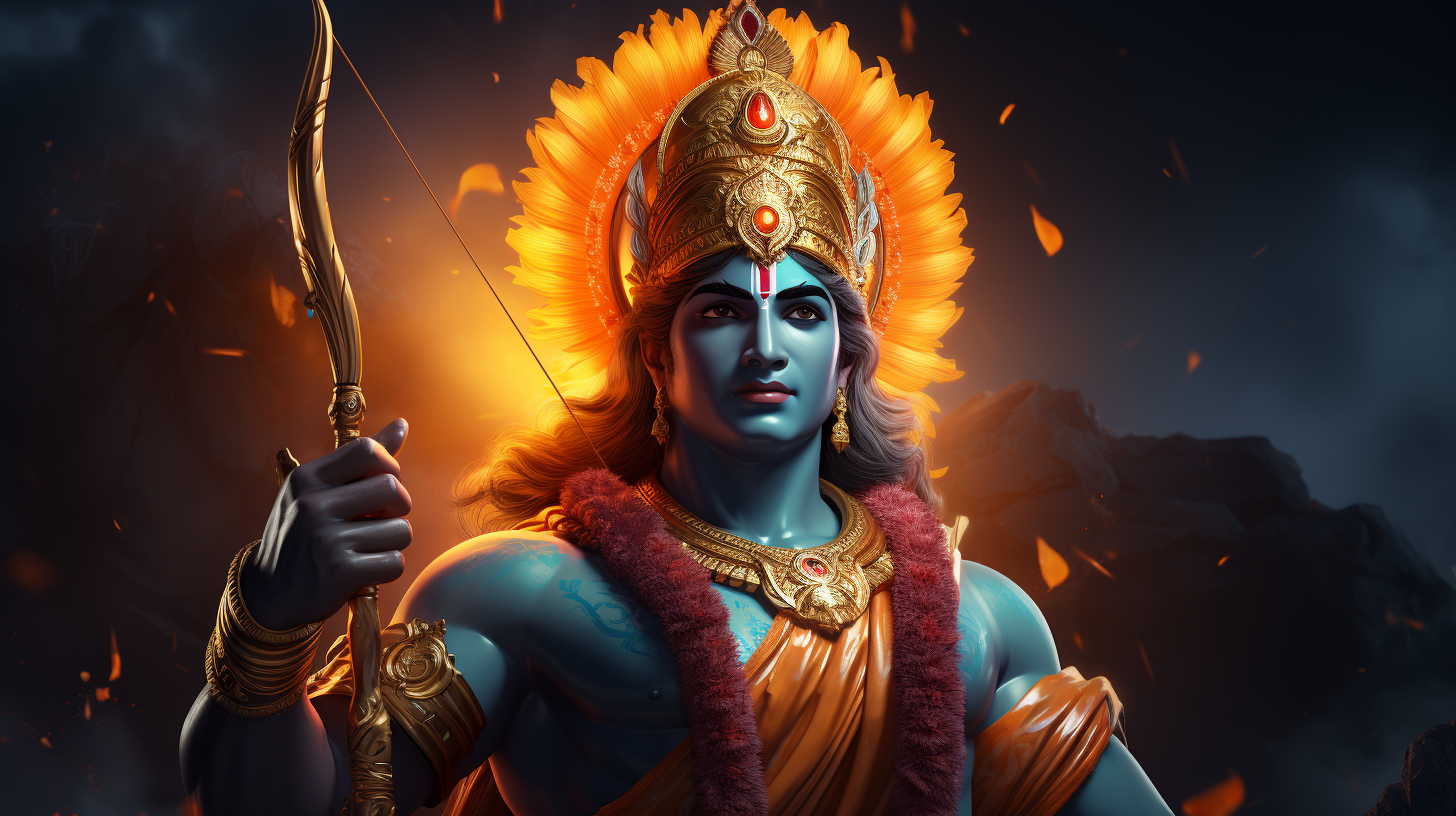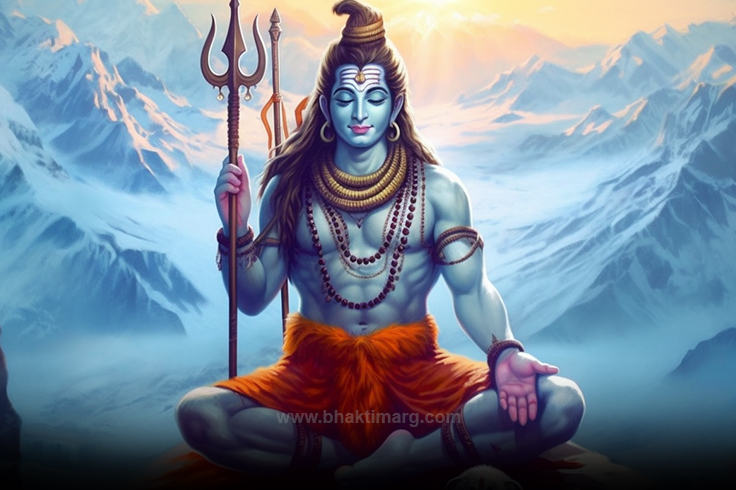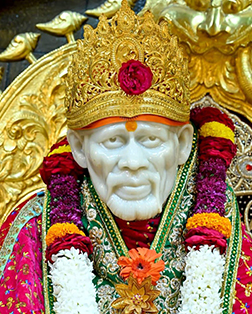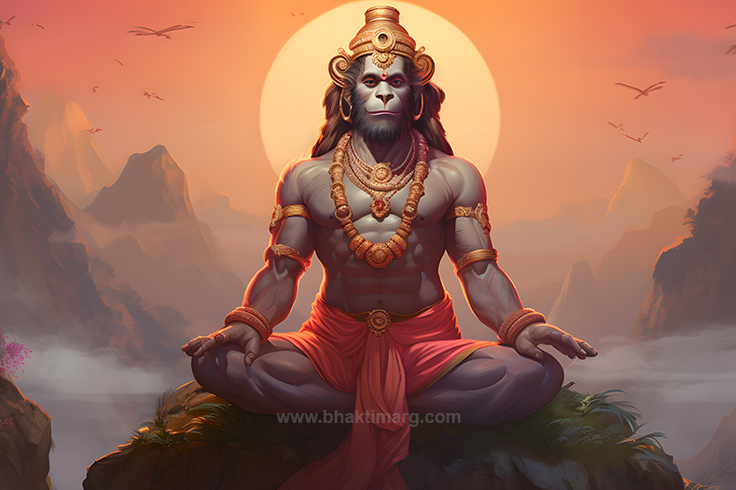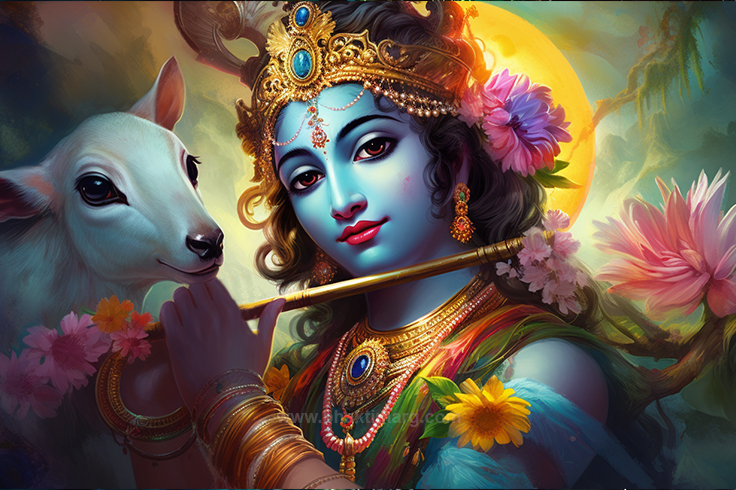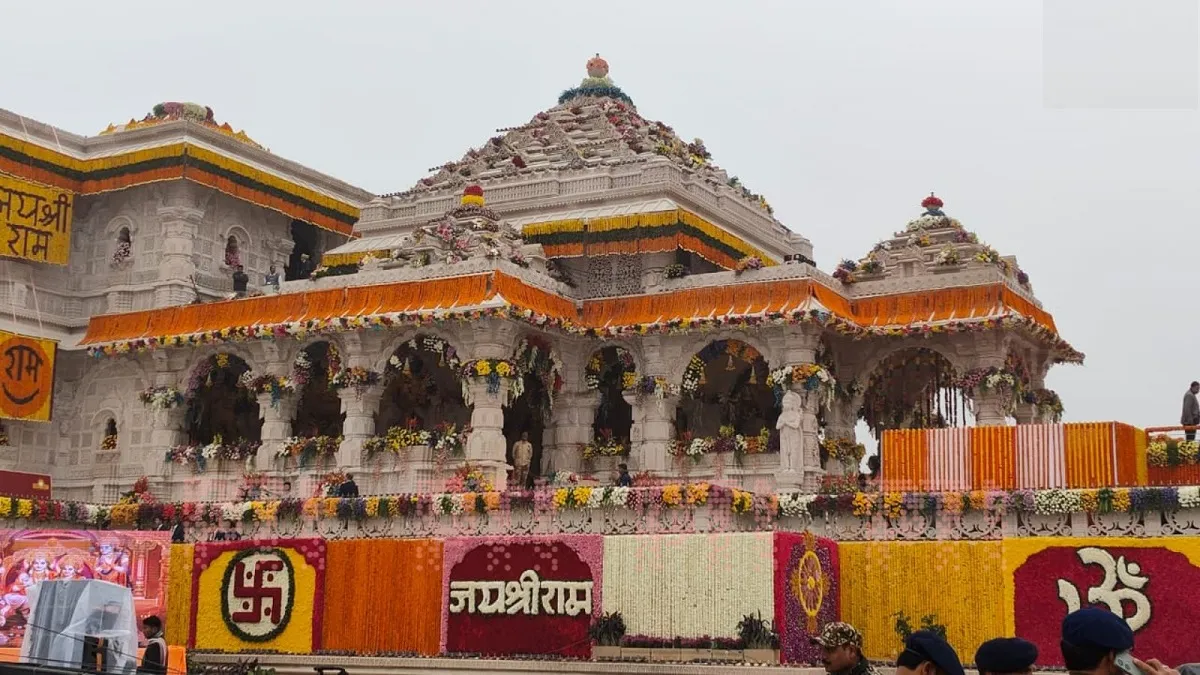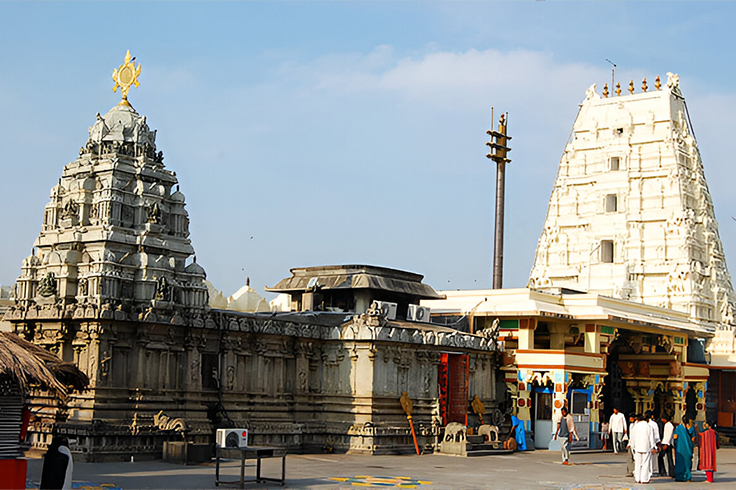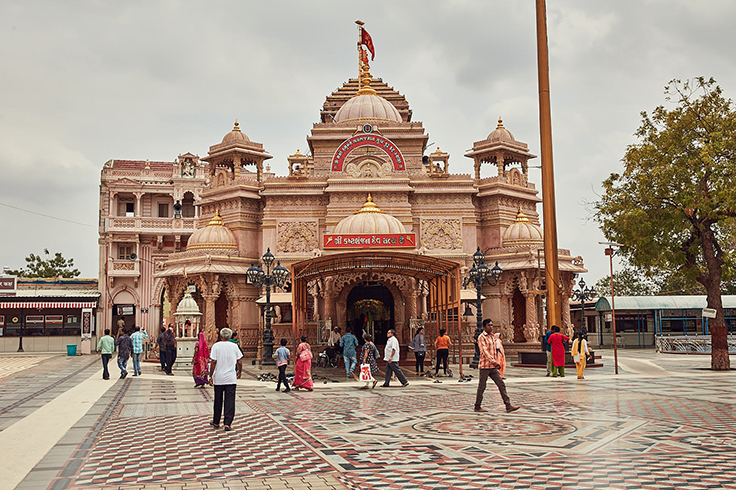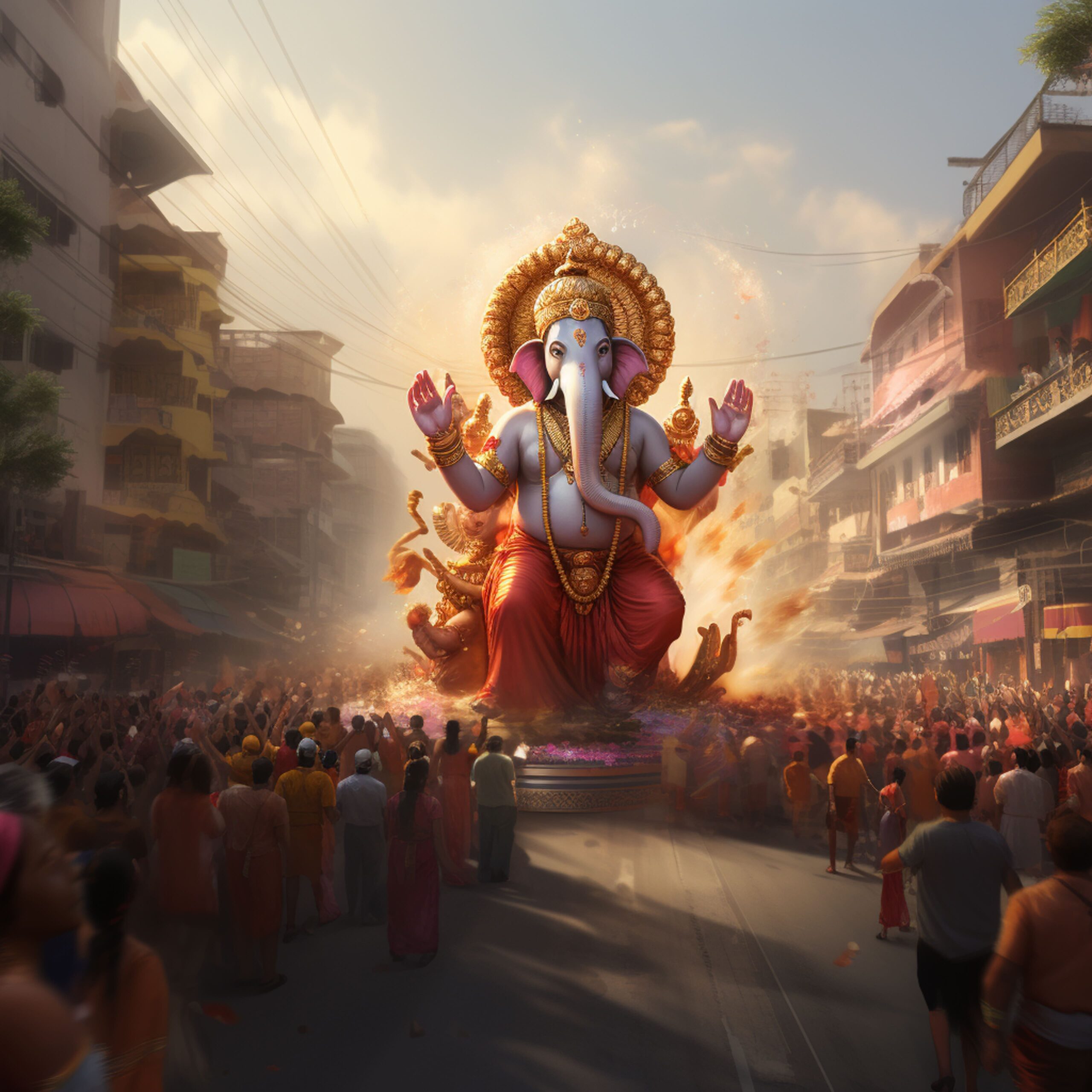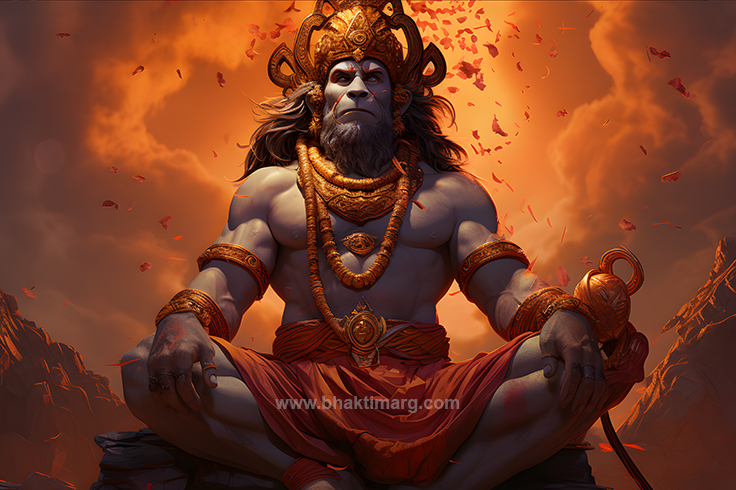
Shree Hanuman Katha in English
Ham Aaj Pavanasut Hanuman Ki Katha Sunate Hain
Pavan Katha Sunate Hain,
Veeron Ke Veer Us Mahavir Ki Gatha Gate Hain
Ham Katha Sunate Hain,
Jo Rom Rom Mein Siya Raam Ki Chhavi Basate Hain
Pavan Katha Sunate Hain,
Veeron Ke Veer Us Mahavir Ki Gatha Gate Hain
Ham Katha Sunate Hain.
He Gyani Gun Ke Nidhan Jai Mahabir Hanuman,
He Gyani Gun Ke Nidhan Jai Mahabir Hanuman.
Punjikasthala Naam Tha Jisaka
Svarg Ki Thee Sundaree,
Vaanar Raaj Ko Jar Ke Janmee
Naam Hua Anjanee,
Kapi Raaj Kesaree Ne Usase
Byaah Rachaaya Tha,
Giree Naamak Sangapar Kya Aanand
Mangal Chhaaya Tha,
Raaja Kesaree Ko Anjana Ka
Roop Lubhaaya Tha,
Dekh Dekh Anjanee Ko Unaka
Maan Harshaya Tha,
Vaise To Unake Jeevan Mein Thee
Sab Khushahaalee,
Parantu God Anjanee Maata Ki
Santaan Se Thee Khaalee,
Ab Suno Hanumant Kaise Pavan Ke Putra Kahate Hain,
Pavan Katha Sunate Hain.
Bajrangbali Us Mahabali Ki Gatha Gate Hai
Ham Katha Sunate Hain,
He Gyani Gun Ke Nidhan Jai Mahabir Hanuman,
He Gyani Gun Ke Nidhan Jai Mahabir Hanuman.
Putra Praapti Kaaran Maan Aanjana
Tab Ki Thee Bhaaree,
Madan Muni Prasann Hue
Anjana Par Ati Bhaaree,
Bakteshvar Bhagavaan Ko
Jap Aur Tap Se Prashann Kiya,
Anjana Ne Aakaash Ganga Ka
Pavan Jal Piya,
Ghor Tapasya Karake
Vaayu Dev Ko Prasann Kiya,
Anjanee Maan Ko Sparsh Kiya
Vaayu Ka Ek Jhonka,
Pavan Dev Ho Prakat Unhen
Phir Putra Pradaan Kiya,
Is Kaaran Bajarang
Pavan Ke Putra Kahate Hain,
Bajrangbali Us Mahabali Ki Gatha Gate Hai
Ham Katha Sunate Hain.
Bajrangbali Us Mahabali Ki Gatha Gate Hai
Ham Katha Sunate Hain,
He Gyani Gun Ke Nidhan Jai Mahabir Hanuman,
He Gyani Gun Ke Nidhan Jai Mahabir Hanuman.
Raaja Kesaree Aur Anjana
Karate Shiv Pooja,
Shiv Bhakti Ke Bina Nahin Tha
Kaam Unhen Dooja,
Ho Prasann Shiv Prakat Hue
Tab Anjana Var Maangee,
He Shiv Shankar Putra Mera Ho
Aapake Jaisa Hee,
Shiv Jee Bole Anjana Hogee
Poorn Teree Ichchha,
Mere Ansh Ka Gyaarah Rudr Hee
Putra Tera Hoga,
Janm Liye Bajarangee
Ghat Gae Sankat Ke Baadal,
Chaitr Shukl Ki Pandrah Ki
Aur Din Tha Shubh Mangal,
Bajarangee Tab Se Shankar Ke
Avataar Kahate Hain,
Bajrangbali Us Mahabali Ki Gatha Gate Hai
Ham Katha Sunate Hain.
Bajrangbali Us Mahabali Ki Gatha Gate Hai
Ham Katha Sunate Hain,
He Gyani Gun Ke Nidhan Jai Mahabir Hanuman,
He Gyani Gun Ke Nidhan Jai Mahabir Hanuman.
Kesaree Nandan Ka Hai Bhakton
Pyaara Tha Bachapan,
Jhool Rahe The Chandan Ke
Paalane Mein Sukh Ranjan,
Kaamakaaj Mein Lagee Huee Thee
Tab Anjana Raanee,
Sooraj Ko Phal Samajh
Unhonne Khaane Ki Thaanee,
Udane Ki Shakti Pavan Dev Ne
Unako De Hee Dee Thee,
Udane Lage Sooraj Ka Phal
Khaane Vaale Bajarangee,
Vaayu Dev Ko Chinta Huee
Mera Bachcha Jal Na Jae,
Soory Dev Ki Kiranon Se
Mera Phool Jhulas Na Jae,
Varph Ke Jaisee Vaayu Dev
Yoon Hava Chalaate Hain,
Bajrangbali Us Mahabali Ki Gatha Gate Hai
Ham Katha Sunate Hain.
Bajrangbali Us Mahabali Ki Gatha Gate Hai
Ham Katha Sunate Hain,
He Gyani Gun Ke Nidhan Jai Mahabir Hanuman,
He Gyani Gun Ke Nidhan Jai Mahabir Hanuman.
Soory Dev Ne Unako Aate
Dekha Apanee Or,
Samajh Gae Vah Pavan Putra Hai
Nahin Baalak Koee Aur,
Sheetal Kar Lee Soory Dev Ne
Apanee Garam Kiranen,
Pavan Putra Guru Rath Par
Chadhakar Soory Lage Dasane,
Amaavasya Ko Jab Raahu
Sarp Das Ne Ko Aaya,
Bajarangee Ka Khel Dekhakar
Bada Hee Ghabaraaya,
Indradev Ko Aakar Saara
Haal Tha Batalaaya,
Bola Ek Baalak Se Main
To Praan Thoda Laaya,
Indradev Ko Saath Mein
Lekar Raahu Aate Hain,
Bajrangbali Us Mahabali Ki Gatha Gate Hai
Ham Katha Sunate Hain.
Bajrangbali Us Mahabali Ki Gatha Gate Hai
Ham Katha Sunate Hain,
He Gyani Gun Ke Nidhan Jai Mahabir Hanuman,
He Gyani Gun Ke Nidhan Jai Mahabir Hanuman.
Lord Hanuman is a divine and heroic deity known for his unwavering devotion to Lord Rama, incredible strength, and role in the Indian epic, the Ramayana. Hanuman’s loyalty, humility, and boundless love for Rama made him a cherished devotee and an enduring symbol of devotion in Hindu scriptures.
Hanuman Ji Ki Katha typically recounts various episodes and adventures of Lord Hanuman’s life. It often includes stories of the birth of Hanuman ji, his childhood, exploits, and his pivotal role in helping Lord Rama rescue his wife Sita from the demon king Ravana. At Bhakti Marg, we believe Hanuman katha, continues to inspire millions, teaching the virtues of loyalty, selflessness, and the boundless power of faith. Millions of devotees worship him worldwide and consider him a deity who can grant strength, protection, and blessings. Hindus, singing melodious Hanuman bhajan, celebrate his birth anniversary, Hanuman Jayanti with enthusiasm.
History and Origin
According to sacred scriptures, Lord Hanuman was born to Anjana and Kesari. Anjana was an ‘apsara’ (celestial nymph) cursed to be reborn as a monkey. To be relieved of this curse, she was told that she would give birth to a powerful son who would play a significant role in the world. Kesari was a monkey king. According to Katha Hanuman ji ki, one day, while Anjana was performing penance, the wind god Vayu delivered a magical sweet to her. Anjana consumed the sweet, and as a result, Lord Hanuman was born to her. For this reason, Hanuman is also called “Pawanputra’.
Lord Hanuman exhibited extraordinary powers even as a child. He was mischievous and playful but used his powers for good. One popular childhood story in Hanuman ji katha involves Hanuman mistaking the sun for ripe fruit and trying to swallow it. He flew towards the sun but was stopped by Indra, the king of the gods, who struck him with his thunderbolt, injuring Hanuman’s jaw. According to Hanuman ji Bhajan, this injury gave Hanuman his distinct appearance with a split chin.
Lord Hanuman is revered for his extraordinary celestial powers and abilities in Hindu Legends . In many Hanuman bhajans hindi, he is often depicted as a divine being with various superhuman qualities. Hanuman is known for his incredible physical strength. His strength played a crucial role in several episodes of the Ramayana, such as lifting the entire Dronagiri Mountain to retrieve the life-saving herb Sanjivani for Lord Lakshmana. These incidents feature prominently in Hanuman ji ki katha.
Hanuman could change his form and size at will, which proved useful in various situations during his adventures. Hanuman had the power of flight. He could soar through the skies and travel great distances quickly. His legendary leap across the ocean from India to the island of Lanka (modern-day Sri Lanka) to search for Sita, Lord Rama’s abducted wife, is one of the most iconic feats mentioned in several Hanuman Mantras.
It is believed Hanuman possessed a form of immortality, granting him an exceptionally long life. Hanuman was immune to certain divine weapons, including the Brahmastra (a powerful celestial weapon). This immunity, according to the Hanumanji mantra, protected him from harm and made him nearly invincible in battle.
Hanuman is considered to be a scholar of various ancient texts, scriptures, and arts. He possessed profound wisdom and knowledge, making him an exceptional strategist and adviser.
Hanuman’s celestial powers, combined with an unwavering devotion to Lord Rama, have made him a beloved and revered deity in Hinduism. He is often invoked for protection, courage, strength, and assistance in overcoming challenges in Hanuman Chalisa Paath. Devotees believe that by chanting Bajrang baan Hanuman Chalisa or reciting his prayers, they can invoke his divine grace and blessings.
Significance
Devotional Inspiration: The stories of Hanuman’s unwavering devotion to Lord Rama in the Hanuman ji mantra in Hindi serve as a source of inspiration for devotees. His selfless service, dedication, and loyalty to his lord inspire individuals to cultivate a strong and unwavering devotion in their own lives.
Strength and Courage: Hanuman is known for his extraordinary physical strength, courage, and determination. The Hanuman powerful mantra in Hanuman Katha emphasizes the importance of developing inner strength, resilience, and the ability to overcome obstacles and challenges.
Protection and Blessings: Hearing and reciting the Hanuman Ji Katha interspersed with cries of Jai Bajrang Bali is believed to invoke Lord Hanuman’s blessings and protection. Many devotees turn to Hanuman to seek his divine intervention and guidance in times of trouble and difficulty.
Removal of Obstacles: Hanuman is considered the remover of obstacles and a harbinger of success. He is thus also popularly called Sankatmochan Hanuman. Devotees recite the Hanuman ji ki Katha with the hope of seeking his assistance in overcoming life’s hurdles and challenges.
Personal Transformation: Engaging with the Hanuman Katha can lead to personal transformation and spiritual growth. Devotees often find solace, guidance, and a sense of purpose through the stories of Hanuman’s devotion and heroism.
Practice
The practice of reciting Hanuman Chalisa full or listening to Hanuman Katha is a deeply revered tradition among devotees of Lord Hanuman. You should find a peaceful and clean space where you can comfortably engage in the practice. Choose a time that works best for you, preferably the early morning or evening, as these times are considered spiritually conducive.
If you have a home altar or a dedicated devotional space, you can place an image or idol of Lord Hanuman. Light a lamp or incense as a symbol of reverence. Start by invoking Lord Hanuman’s blessings. You can chant the Bajrangbali Hanuman Chalisa or a simple prayer to seek his presence and guidance. You can read stories from books or listen to narrations of the Hanuman Ji Katha. As you engage with the stories, reflect on the moral, ethical, and spiritual lessons they convey. Consider how you can apply these teachings to your own life and spiritual journey.
Alongside reading or listening to the stories, you can chant Hanuman mantras such as the Hanuman Chalisa, Hanuman Ashtak, Hanuman Stavan, or the “Om Anjaneyaya Vidmahe” mantra. Chanting these mantras can deepen your connection with Hanuman. During and after the recitation, you should express your devotion and gratitude to Lord Hanuman. Offer heartfelt prayers, express your wishes, and seek his blessings for your well-being and spiritual growth. Conclude your practice by offering prayers, performing aarti, chanting the Hanuman 108 names, and thanking Lord Hanuman for his presence. You can also extend your wishes for the welfare of all beings.
Whether you choose to engage in this practice daily, on specific days, or during auspicious occasions, regularity helps deepen your spiritual connection with Lord Hanuman. Beyond the practice of reciting jai Hanuman Chalisa lyrics, strive to embody the qualities of devotion, courage, humility, and selfless service that Lord Hanuman exemplifies in his stories. Remember that the practice of reciting or reading the Hanuman Ji Ki Katha is a personal journey, and the intention behind your practice is what matters most. It’s an opportunity to connect with the divine, seek guidance, and cultivate virtues that lead to personal and spiritual growth.
What Are the Main Benefits of Learning Hanuman Katha?
Engaging with the Hanuman ji Katha deepens your connection and devotion to Lord Hanuman. It helps you build a personal relationship with him and fosters a sense of closeness to the divine.
Hanuman’s stories are filled with acts of courage, devotion, and selflessness. Listening to or reciting his Katha inspires and motivates you to emulate these qualities in your own life, encouraging personal growth and positive change. Hanuman is known for his immense physical and inner strength. The Katha instills a sense of inner strength and resilience, helping you face life’s challenges with a positive attitude and determination. Hanuman is often invoked as the remover of obstacles. Reciting the Katha of Panch Mukhi Bajrang Bali with faith and devotion is believed to help overcome hurdles and difficulties in various aspects of life.
Listening to or reciting the Hanuman Katha or Hanuman Ji Stavan in praise of Hanumanji is supposed to invoke Lord Hanuman’s blessings and protection. It can create a sense of security and comfort, knowing that a divine presence is watching over you. The stories of Hanuman’s unwavering devotion, humility, and selflessness serve as moral lessons. Engaging with his Katha encourages you to cultivate these virtues in your own life, leading to personal and spiritual development. Immersing yourself in the Katha Hanuman Katha Ji Ki, along with chanting the 12 names of Hanuman Ji provides a sense of calm and peace. It can serve as a form of meditation, helping reduce stress, anxiety, and negative emotions.
Hanuman’s stories radiate positivity and divine energy. Engaging with the Katha uplifts your spirit and helps you focus on positive aspects of life. Devotees often recite the Hanuman Ji Katha and Hanuman ke 12 naam with specific intentions or desires. It is believed that Lord Hanuman’s blessings can help fulfill sincere wishes.




